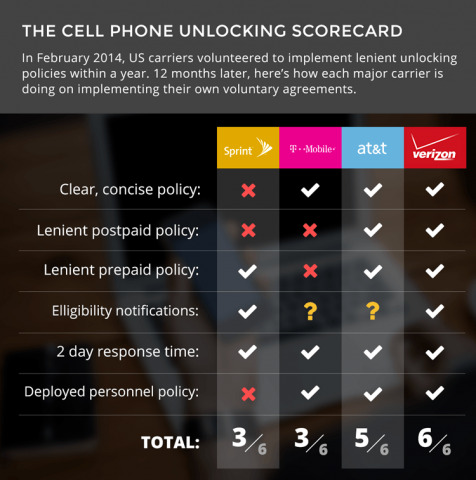Carriers unsurprisingly not so eager to unlock phones
You might have been quite jubilant over the news that the CTIA-The Wireless Association disseminated guidelines for unlocking smartphones as part of agreement with the FCC. However, those guidelines are just that and, considering there isn't any law to be broken, some carriers are apparently unenthusiastic about complying. Consumer advocate Sina Khanifar, who instigated all these changes in the industry, finds some carriers have not fulfilled their 2013 promise to ease the process of unlocking phones, and T-Mobile and Sprint are apparently the worst offenders.
Two years ago, the FCC was able to push carriers to agree to six rules for unlocking phones. The understanding was that by May 11, 2014, three of the six should have been implemented and that by February 11 this year, all six should be in effect. Those six are:
• Post clear, concise unlocking polices on public website
• Provide lenient postpaid policies
• Provide lenient prepaid policies
• Provide eligibility notifications to the customer when their devices can be unlocked
• Respond to unlock requests within two business days
• Unlock devices to deployed military personnel
With the deadline passed, Khanifar went back to check on the progress of the four major US carriers and their report cards are pretty disappointing but actually not unexpected, given the potential impacts on business unlocking might entail. Of the four, only Verizon had a perfect score. AT&T is just one point behind. T-Mobile and Sprint, however, didn't hold their end of the bargain and have so far implemented only three of the policies.

The problem, at least for consumers, is that carriers are not exactly legally bound to comply with all of these, at least depending on how the FCC decides to pursue the agreement. In fact, in 2012, the Library of Congress actually made unlocking smartphones illegal by removing an exemption to the notorious Digital Millennium Copyright Act (DMCA). Fortunately, Congress passed a bill last August that reinstated that exemption, albeit only until the end of this year. Khanifar suggests that Congress should pass a more strongly worded bill that states with certainty that it is illegal to unlock smartphones in certain circumstances. It's highly likely that this proposal will be met with strong opposition from industry lobbyists.
SOURCE: Sina Khanifar
VIA: VentureBeat
